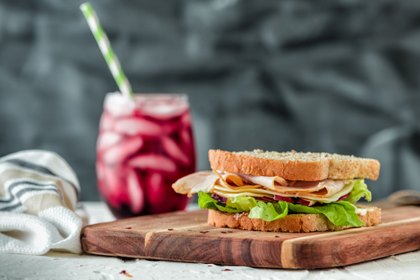
Q: I’ve been reading so much about health and healthy eating, but this phrase “healthy relationship with food” keeps coming up. Is this just another millennial buzzword? What does it mean?
A: This is such a great question. We nutrition professionals throw around these terms as though they make sense, but sometimes they hit the public as clear as mud on a shower door. Do you have a healthy relationship with food? Are you committed to your turkey sandwich? Is your tofu being unfaithful? What exactly is a healthy relationship with food?
Consider your relationship with your parents, your spouse, or the angry neighbor who gets so stingy with his lemon tree. Any healthy relationship with another person will include appropriate boundaries, mutual respect, trust, honesty, support, equality, separate identities, good communication, and room for playfulness*.
Our relationship with food can be easily compared to the dynamic we can expect within a marriage. We marry for many reasons, not just for procreation. We also marry for companionship, mutual growth, and a steady Pictionary partner. (Ok you history buffs, I’m discussing marriage—right here, right now—not the marital dynamics of Henry VIII and Anne of Cleves.)
On the same note, we eat for many reasons. You may have a meal because you’re hungry, or because lunch is scheduled for this moment. That delicious scoop of Ben & Jerry’s Phish Food ice cream after a long day. A beautifully decorated slice of red velvet cake while at a wedding celebration. Maybe you have family from the American South, and you choose to eat black eyed peas on New Year’s Day for good luck and prosperity. Does your challah takes on an auspicious round shape in the fall for the High Holidays?
Many of the same points which are used to gauge a healthy relationship within a marriage can be used to assess if a person’s relationship with food is healthy. And having a healthy relationship with food goes hand in hand with a healthy relationship with your body. So let’s break this down point by point.
Healthy Boundaries and Mutual Respect: When you have a healthy relationship with food and your body, you don’t feel that you are ruled by food, constantly obsessing over what your next bite will be. Or that you need to micromanage your nutrition, accounting for every taste. You make choices out of confidence, rather than fear. You are able to go out with friends or family and fully participate in social events. There are no feelings of food-related isolation.
Trust, Honesty, Support, and Communication: You can trust that your body will tell you when to eat and when to stop and that your body knows how much nutrition it needs at a given time, based on an amazingly complex set of equations which only your body can perform, and accounting for genetics, weather, health status, sleep quantity and quality, level and length of activity, as well as simple desire.
Separate Identities: You are not your food choices. You are, in fact, NOT what you eat. You are YOU, choosing to nourish your body as it needs to be nourished. Food choices do not make you a good or bad person. Your food choices don’t define you any more than the book sitting on your nightstand or the shirt you picked out of the closet this morning. Choose to be defined by something more important—by being a good friend, for example.
Room for Playfulness: This is my favorite point. A healthy relationship with food will include room for play. This could be room for enjoying something delicious just because it’s delicious. Room for play could be an adventurous attitude at the table, like willingness to try something unfamiliar and possibly amazing. It could be room for playfulness with your kids, taking an afternoon to make chocolate chip cookies or avocado facials together.
When using our social microscope, a healthy relationship with food will look different for each person. But by taking a step back and looking at the bigger picture, we will see that a healthy relationship with food always means comfort with and around food. A person who has a healthy relationship with food will meet her nutritional needs automatically, by enjoying a variety of colors and textures without the need to micromanage her plate.
A healthy relationship with food, much like a healthy marriage, will feel comfortable and engaging, and be full of respect and mutual understanding. And there will always be room for playfulness—even if he can’t for the life of him draw a monkey on a bicycle.
If you are in search of a healthy relationship with food and are having trouble getting there on your own, seek out a non-diet dietitian to help guide you. The advice given in this article can certainly fit within the boundaries of medically necessary diets. If you are experiencing a health condition that impacts your nutrition, please be in touch with a non-diet dietitian to help fit your medical needs into a healthy dynamic.
————————————-
*Hall Health Center, University of Washington